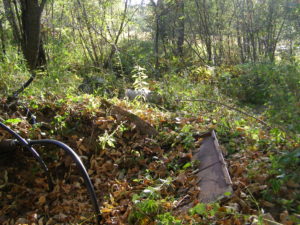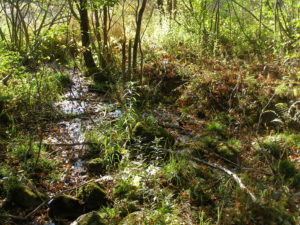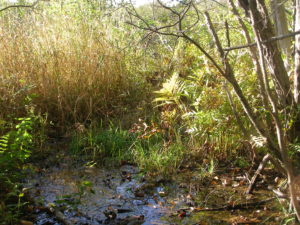by Jenny Rose | Oct 5, 2017 | Emotional Intelligence, Feelings, Love
A few weeks ago I wrote about romance and in that post I confessed that at this point in my life I’m not sure what love actually is. A strange admission from a reasonably intelligent, well-educated, middle-aged broad with two marriages and two children in her history.
Writing that post enabled me to clearly separate romance from love; though I suppose love might include a little romance from time to time. I’m convinced romance is not synonymous with love, however. I began to make a mental list of what love is not, as I often approach things from the back door first. Love is not a synonym for:
- Romance
- Sex
- Slavery
- Control
- Possession
- Obsession
- A suicide pact
- Abuse
- Fear
- Duty
- Obligation
- Enabling
- Obedience
All right. So what is love? My Randall House Collegiate Dictionary says it’s “a profoundly tender, passionate affection for a person” or “a feeling of warm personal attachment or deep affection.” This definition doesn’t satisfy me at all. My rewrite is that love is a feeling of warm, tender connection and deep affection. I don’t think love is always passionate and I don’t like the word attachment. If anything, love implies to me an attitude of nonattachment.
But what about unrequited love? What about failed love or withdrawn love or love as a weapon or a tool? What about the inability to accept love, or feeling unloved though being told we are? What about those who make us feel our love is ugly, twisted, shameful or inadequate?
I’m always playing with words in my head. This week it’s “What is love?” and “What is a crone? and “What are the differences between compassion, empathy and sympathy?” I lie down with those inquiries and wake up with them. I turn them over while I shower, cook bacon, wash dishes, take my morning walk, practice Tai Chi and drive to town. I’m constantly scribbling notes.
I gave a neighbor a lift this morning and asked him to talk to me about compassion, sympathy and empathy. Poor man. He didn’t know what to make of me.
Yesterday, during my frosty morning walk, I dove into a stand of staghorn sumac below the barn and went to visit the spring. This is a daylight spring seeping out of the hill on which the barn and house stand. A long time ago, someone dug a well there, and at one time a pump and tank were installed, along with a system of black plastic outdoor lines to carry water to and from the barn, the garden, and down through the woods to, presumably, crops in the fields below. All the equipment is many decades old now, fallen over and covered with leaves and moss. The well is protected by a round cement cap, much too heavy for me to lift alone (drat!).

Spring
This spot is hidden in a thick tangle of vine, briar and trees. We rarely go in there, though it’s in close proximity to the barn.
It’s fall and it’s been dry, but the drainage where the spring emerges is clearly marked by rocks and moss. The ground underfoot felt soft, and when I brushed away the leaves I found moist earth. A yard or two below that is mud, and then a trickle of water and then, at the bottom of the hill, a quiet film of water, barely moving, reflecting the tree-laced sky. Right now It’s full of apples dropped from an apple tree that grows alongside it.
As I slipped and slid, tripping over vines and getting scratched by hawthorn and raspberry bushes, feeling the velvety moss coating the rocks and stepping cautiously on rotting wood, it occurred to me that love is like this spring.
I’ve always thought of love as an action verb, something I do to another in exchange for receiving the same. I thought I knew what I meant when I used the word, though I was never challenged to define it exactly. For me it’s been a catch-all term, synonymous with dozens of other, more specific actions: Want, need, desire, honor, trust, respect, care about, listen to, defend, make excuses for, enable, protect, support, believe in, etc., etc.
But what if love is just being? What if it has no object, but just is?

Spring
This little spring is absolutely true to itself. Water drains off the hillside above us and carves a path through the earth and rock until it emerges and runs down the surface at the foot of the hill. We pay no attention to it whatsoever. It’s reliable, predictable and faithful, but not because anyone is looking. Its unobtrusive, quiet presence has created a lush pocket of life, a complex system of plants, fungi, animals and insects, but ten yards away on the open hillside it’s invisible.
What if I make a choice to allow my feeling of love to run through my life in the same way the spring runs through and over the ground? What if I carry within me a wellspring, a hidden cleft, moist, fertile, filled with life, rich in sensuality, simply because it’s an expression of self? If others find their way to it, sit a while, bathe, drink, and allow it to nourish and refresh them, they’re welcome. If others can’t see it, or don’t value it, or dislike the perfume of rotting wood and leaves or the feel of plush moss under their bare foot, it’s nothing to do with me. Not everyone chooses to make their way through raspberry and hawthorn bushes, after all.
What if I don’t need anything in return because I’m giving nothing away? Perhaps the act of love can be a simple state of being, not a totality, not a hurricane of passion and lust, not a romantic fairytale, not a prison and torture chamber, but a spring, a waterway, a shining thread I can share without depletion. Can I allow it to seep quietly up through the roots of my experience, even if no one else ever finds it, wants it, returns it or deems it acceptable?
Our spring is part of a landscape of field and forest, river, pond and stream, rocky hillside and bog. The landscape contains many forms and embraces many systems of life. Birth and death happen on this land. Disease, erosion and flood happen on this land. Prey and predators carry out their sacred dance of balance here. Blood, bone, fur, feather, antler, musk, urine and feces are all here.
I, too, am a complex system of history, memory, belief, thought and feeling. I do not feel love for everyone and everything. My experience of love is that it’s a wild thing; it seeps up where it will and trickles away without warning, taking no account of rules and expectations. I can’t command it and I don’t choose to hold it back. My love doesn’t need anyone’s reception, appreciation, validation or praise.
Love is. I reserve the right to love as I will. I am the keeper of my own wellspring.

Spring 10/2017
All content on this site ©2017
Jennifer Rose
except where otherwise noted
by Jenny Rose | Jun 29, 2017 | Connection & Community, Emotional Intelligence, Shadows
I’m getting ready to turn over the manuscript of my first book to a developmental editor. Getting ready means I’m doing one final read through and combing out overused words and phrases using the search (and destroy) feature in my word processor. Over the months and years I’ve been working with my book and mastering the mechanics of writing, I’ve learned a lot about language and my own personal tics and patterns. The biggest problem I’ve found in my writing is unconsciously using passive voice.

Photo by freddie marriage on Unsplash
On the face of it, the process of cleaning up a manuscript is straightforward and occasionally mind-numbingly tedious. Looking at 4000 plus occurrences of the word ‘was’ throughout 1000 plus pages is not filled with giggles and takes a long time. I entertain myself with battleship noises every time I eliminate ‘was’, ‘were’, ‘had’, or ‘have’. I also come up with amusing similes for the process. My favorite is that editing is like combing nits out of a child’s hair.
On the plus side, this practice opens up a lot of time in which to notice my unconscious language patterns and think about how word choice reflects my choices in every other aspect of life. Editing word by word in this way is also a great habit breaker. When I write ‘had’ or ‘have’ now I notice it.
In the past, I’ve also overused ‘gently’, ‘lightly’, ‘quietly’, ‘a little’, ‘went’ (that’s a common one), and ‘softly’. As these patterns become visible to me, I ask myself with some annoyance, why not ‘fiercely’, ‘loudly’, ‘a LOT’ or ‘strode, galloped or dashed’?
I’ll tell you why not. Because I’m female and my culture has successfully taught me to make myself small. That lesson is so central and ubiquitous I’ve only recently been able to identify it and organize resistance. The message is impossible to see until you see it, and then you can’t unsee it.
Do you know the old French fairy tale of Bluebeard? A serial wife killer instructs his latest victim to refrain from opening a door in his castle, the door a particular little key opens. Then he leaves her alone with his keys (of course). In his absence, Bluebeard’s young wife and her sisters explore the castle, opening every door, and (naturally) the wife is persuaded there’s no harm in just peeking behind that last forbidden locked door. In the room they discover a row of headless bodies and a pile of heads belonging to Bluebeard’s previous wives. They exit the room (as you might imagine) and conspire to pretend they never unlocked the door. The only problem is the little key that unlocked the door begins weeping drops of blood and nothing they can do makes it stop. Bluebeard returns, discovers the infraction, and … I won’t tell you what happens, because different versions of the story end differently. This fairy tale is embedded in my own book. The point is, once some things are understood and seen, they can’t be unseen. There is no going back.
So, consider this commandment with me: Make Yourself Small.

Photo by Hailey Kean on Unsplash
- Adhere to the arbitrary cultural ideal of acceptable attractiveness. If you can’t, hate your body, torture it, starve it, distort it, color it, shave it and beat it into compliance. Make yourself conform.
- Let media, social media, experts, professionals, your favorite news channel or radio host, your religious leader, your parents, or the men in your life tell you what to believe and what to think. Don’t you bother your pretty little head trying to understand anything.
- Make your sexuality, passion and lust small. In fact, make them invisible (you slut).
- Make your intelligence nonthreatening.
- Tame your creativity.
- Don’t ask questions. Don’t search for clarity and truth. Don’t do your own research. Restrain your curiosity.
- If you must have needs, make them as infinitesimal as possible. Your needs are dust in the wind compared to the convenience, habits and preferences of others.
- Be silent! You are disqualified from having an opinion. Don’t tell your truth. Others are speaking. Censor your voice. Don’t make anyone uncomfortable.
- Capture, restrain, cage, shackle, chain and abandon your dreams. Who do you think you are?
- Deny, belittle, smother and minimize your feelings. Control yourself!
- Shame on you! Cringe, cower, hide your head! You’re bad and wrong!
- Be self-contained. Be self-sufficient. Don’t take up too much space. Move lightly. Don’t spend too much money. Don’t be too dramatic. Don’t be too sensitive. Don’t order dessert. Don’t attract attention. Don’t breathe too much air. MAKE YOURSELF SMALL!
You get the idea, I’m sure. This list goes on and on. The message is everywhere, and we’re all affected. It cuts across social, racial, economic, political and gender divides. Failure to toe the line, whatever that line is, results in harsh social and professional consequences, up to and including death. Show me a headline and I’ll pick out this theme. I trip over it a dozen times a day in my own life. Spend five minutes on Facebook reading any thread on any subject and you’ll find this underlying message.

Photo by James Pond on Unsplash
The surrounding cultural mandate to make ourselves small is toxic, but it’s not the heart of the problem. The heart of the problem is our internalization of the mandate before we’re even aware of it, and then it becomes so woven into the fabric of our experience we no longer discern it.
Ironically, stubbornly pursuing my passion for writing and my determination to be bigger is what reveals to me the outlines of my own self-sabotage. My habit of making myself small has trickled all the way down to the words I choose. Editing my manuscript has become editing my thoughts and choices, and noticing the words I write and think in helps me notice my feelings.
My feelings contain a lot of fury and a lot of rebellion, far more than I was aware of when I created this blog last summer. Minor friction with my partner about planning a day or how we utilize counter space taps into a deep vein of lifelong rage and pain about allowing and participating in my own repression and oppression. I have systematically colluded in my own erasure. I’ve agreed to make myself small. I’ve agreed to abdicate my power.
No more. I opened Bluebeard’s chamber, and saw what it contained. The key that unlocked the door was writing, and I’m deleting all the blood-stained words that make my art small. If I fail as a writer, I’m not going to do it softly, gently, lightly or a little. I’m going to do it thunderously, monumentally and profoundly.
It’s time to make myself big.

Photo by Stephen Leonardi on Unsplash
All content on this site ©2017
Jennifer Rose
except where otherwise noted
by Jenny Rose | Apr 20, 2017 | Power
I came across a prayer to Baba Yaga recently. I’ve spent a lot of time with Baba Yaga, who is a supernatural female figure out of Slavic European folklore. I’ve told stories about her for years, and she’s an important character in my book. She’s a powerful life-death-life-death figure and has many names, among them Storm Raiser, Primal Mother, Lady of Beasts and Mother of Witches. In spite of our long acquaintance, I’ve only lately begun to love her.

Photo by ivan Torres on Unsplash
Sometimes I think the most important thing to understand about life is power. It structures every single relationship, most of all our relationships with ourselves. Power creates wars, cults, murderers, abusers, tyrants, rebels and perhaps angels.
I believe we have a great longing for our individual mislaid power, such a longing that we’ve lost track of what it is or how to recognize it in our hunger and desperation. I don’t know how else to explain our mindless obedience to the media, to our culture, to our religions, to the almighty “they” who instruct us how to live, how to eat, what to believe, how to look, how to buy and how to be.
At this time in my life, and at this time in my country’s history, I cling to Baba Yaga, because she represents sanity in a world becoming more insane by the day. The prayer reminds me of what true female power is — and is not.
True female power wastes no time on despots and bullies who conceal their fear and impotence behind dishonesty and the willingness to use force. It’s not her business to prop them up. They have nothing she needs and they’re not worth her attention, for they shall not endure.
True female power is real. It’s authentic. It’s not bound by chains of political correctness, manners, fear or ideology. A woman in her authentic power is, according to need and whim, a child, a wild woman, a bitch, a seductive temptress, a crone, and a creature of magic. Obedience and compliance are not in her nature.
True female power seeks the hidden thing, within and without. She pares away layers, stories, masks, facades, dreams, visions, expectations, and shoulds. She’s a persistent poker, prier and meddlesome busybody in holey tennis shoes. She opens drawers, boxes and jars, looks behind forbidden doors and never stops asking questions. She refuses to shut up, close her eyes or pretend, and views everything by the stark light of a fiery skull without flinching. She doesn’t need anyone to agree with her, and she doesn’t need everyone to agree with her. She doesn’t argue with what is. The truth cannot escape her.
True female power doesn’t prostitute for love and validation. Baba Yaga eats sulfur to make her farts more momentous and fertilizes her body hair to make it grow more abundant. She’s hairy legs and iron-tipped fingers and teeth sharpened on bones. She takes a lover when she feels like it, but she kicks him out of her bed before dawn and doesn’t offer breakfast. Her body is not for sale, her hair is the color it wants to be, and she has no use for a painted mask over her face.
True female power is a teacher of magic. She teaches the sorting of one thing from another, cleansing, lighting a fire, the alchemy of cooking. She’s the power of the cauldron, the cup, the womb and the growing seed. She’s the wisdom of bone and blood, seed and water, life and death. A woman in her authentic female power learns to feed and nurture the magic of her intuition and creativity. She knows they are the most priceless jewels she will ever have.
True female power feels huge, deep feelings of rage, grief, joy and lust. When fear accosts a woman in her power, she spits in its eye and knocks it down on her way forward. An authentically powerful woman knows how to cause earthquakes with her dance, bring rain with her tears, melt rocks with her passion and sow stars with her joy. She allows no one to make her small.
True female power expresses all her fine feelings. She shrieks, curses, cackles, stomps, grumps, slams and mutters. She will not be silent. She stays up all night drumming and dancing if the mood takes her, and sleeps all day when she wants. She collects secrets, stories, marbles and insults with equal enjoyment. In fact, she says and does exactly what she wants to do and say.
(Yes, I said marbles.)
True female power is ancient and enduring. It’s coarse silver hair, aching bones, pearly stretch marks, lumpy thighs, scars and wrinkles and cracks and crevices. A woman in her power bleeds, first red and then the invisible silver blood of wisdom that arrives when the children of her body have become ghosts living only in her memory. A woman in her full authentic power smiles kindly on the young and beautiful, because they are not yet capable of her wisdom.

Photo by Cristian Newman on Unsplash
True female power knows how to live through the night alone, how to wander in the desert, how to go underground and live in a cave among the roots of life when necessary. She survives the conflagration, the invasion, the prison sentence, the betrayal, the loss, the beating, the chaos, the flood. A woman in her authentic power is rooted in the stars, in the trees, in the mountains, in the sea and in the earth. She welcomes cycles and seasons. Change is her strength. She knows how to bide her time and let die what must, because she knows her power will endure in women who come after her.
A woman in her power is not confused. She knows there’s no authentic power in money or position, youth or beauty or hairless legs. She knows her wellspring of power is internal and if she can’t find it, no one will. True feminine power defines her own success, her own goals, her own agenda, her own spiritual practice, her own beauty and her own rules.
Baba Yaga’s specialty is too-good maidens of all ages. That’s how I met her. When the Baba is finished with such a maiden, she’s either saltier and wiser or dead. Baba Yaga eats the dead ones with vinegar to cut the sweetness.
It’s a good time for prayers. Perhaps it’s always a good time for prayers. Here’s mine:
Baba Yaga, Grandmother, we offer you our sweat, tears, blood, milk and urine. Initiate us into life and death with our own blood and bone. Lead us back into love for ourselves, our bodies and our earth. Help us, your daughters, find our authentic feminine power again.
All content on this site ©2017
Jennifer Rose
except where otherwise noted








